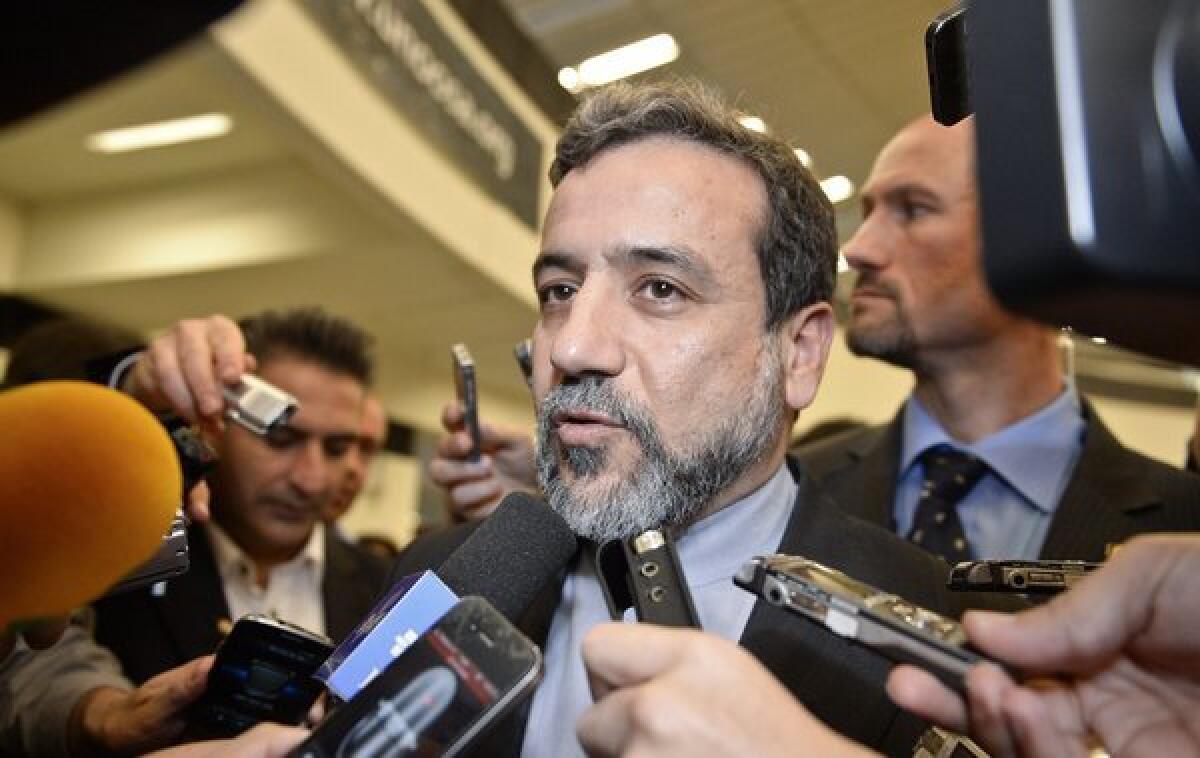Iran may be lowering expectations for next round of nuclear talks

- Share via
WASHINGTON -- Iranian officials appear to be trying to sharply lower expectations for the round of international nuclear negotiations set to begin Thursday in Geneva.
In an interview in a reformist newspaper, Iranian nuclear negotiator Abbas Araqchi said he expects this week’s session will focus on the broad outline of negotiations, and that he doesn’t foresee the first concrete steps toward a deal for about three months.
“If both sides have goodwill, and if the seriousness and political will both sides have shown so far continues, then within three months we can get to the first step,” Aftab reported Araqchi as saying.
The prediction suggests a much slower timetable than Iranian officials described six weeks ago. At meetings at the United Nations in September, Iranian Foreign Minister Mohammad Javad Zarif spoke of his hope for concluding the entire deal within three or six months.
The comments appear to reflect “seriously lower expectations,” said Ray Takeyh, an Iranian specialist at the Council on Foreign Relations.
At the negotiations, Iran will be facing the United States and five other world powers that want to limit Iran’s nuclear program, fearing it is aimed at developing a nuclear weapons capability. Iran claims its goals are non-military.
Takeyh said Zarif has also cautioned Iranians not to expect the quick lifting of Western economic penalties that they have been yearning for. He also noted that U.S. officials have recently asked Congress to delay new sanctions for 60 days, a hint that the Obama administration also expects a slower pace of talks.
But Takeyh added that Araqchi’s comments could be a tactical move -- a “head fake” -- in advance of the new meeting, which is the second in three weeks.
The U.S. and its Western allies are not likely to be pleased by a long period of preliminary discussions. They want Iran to quickly accept temporary curbs on its nuclear program, so that Tehran cannot keep making progress toward a nuclear capability while talks drag on.
Some analysts say they believe that Iran may have the capability to make a nuclear bomb by mid-2014, although the Obama administration does not believe that it is that close to the threshold.
With the negotiators set to meet Thursday, both sides appear to remain far apart on the terms of any deal.
Obama administration officials, in private talks with U.S. lawmakers, have insisted that they are not about to grant the substantial and immediate easing of sanctions that is the Iranian goal.
Iranian officials continue to talk about their “red lines” for a deal, which run counter to the demands of the six world powers negotiating with them. The Iranian officials say they won’t agree to halt all uranium enrichment, to ship their current stockpile of enriched uranium out of the country, or to close down their existing nuclear facilities.
In Washington and Tehran, hard-liners are pushing against any compromise.
In the U.S. Senate, key supporters of additional sanctions are pushing for work to begin next week on advancing a bill in the Banking Committee that would further reduce Iran’s ability to sell its oil abroad.
The administration’s effort to persuade pro-Israel groups to halt their lobbying for more sanctions has been only partly successful. Though some groups have agreed to accept a temporary pause, the American Israel Public Affairs Committee said last weekend it will continue to urge more economic penalties.
Araqchi reportedly told Aftab that “if new sanctions are approved, definitely, the path of negotiations will be destroyed.”
Suzanne Maloney, an Iran specialist at the Saban Center at the Brookings Institution, said the near total trade embargo that is the aim of some legislation is likely to be especially provocative in Iran for historical reasons. Such an embargo was slapped on Iran in 1953 before a CIA-engineered coup brought down its democratically-elected prime minister, Mohammed Mossadegh.
In Tehran, hard-liners have been waging a public campaign to prevent any deal-making. They have denounced the recent outreach to the United States in editorials and addresses in mosques. Thousands have demonstrated in recent days, chanting “Death to America” and carrying effigies of President Obama and Secretary of State John F. Kerry.
Iran’s supreme leader, Grand Ayatollah Ali Khamenei, appeared to support the negotiators in a speech Sunday, saying that “no one can label them compromisers.”
But Takeyh, who is a former administration advisor on Iran, said Khamenei signaled in the speech that he is not about to halt his lifelong opposition to the U.S.
“He seems to want to get through negotiations so he can go back to his resistance economy and resistance life,” Takeyh said.
ALSO:Syrian government forces advance against rebels
Trove of paintings has works looted by Nazis, masterpieces
Military, CIA compelled medics to abuse detainees, report says
Staff writer Richter reported from Washington and special correspondent Mostaghim from Tehran.
More to Read
Sign up for Essential California
The most important California stories and recommendations in your inbox every morning.
You may occasionally receive promotional content from the Los Angeles Times.











